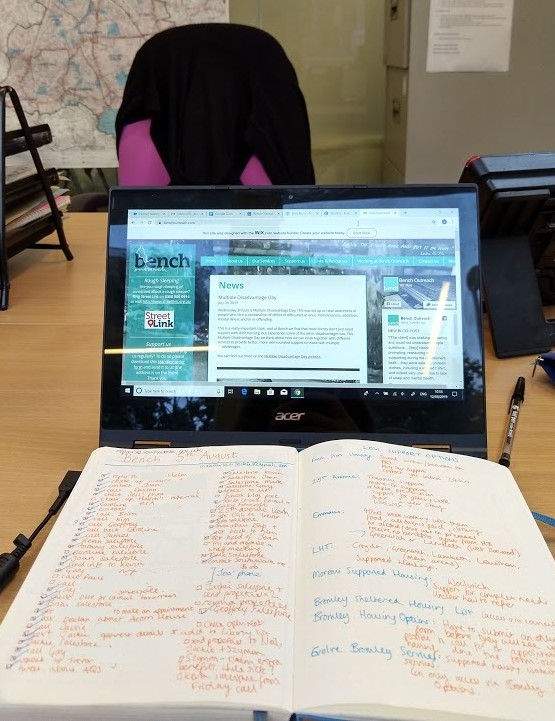Many disabled people are struggling to survive on benefits, meanwhile the DWP is constantly pressuring them to prove their disabilities ‘deserve’ benefits.
I’m writing this blog at the end of our third work week of 2020. While it’s great to be back and to check in on my lovely clients, some of them are really struggling. By the end of my first working day of 2020, three people had already told me they simply aren’t coping with their disabilities.
Before I worked in benefits advice, I just didn’t realise how many people who physically or mentally are not able to work are barely surviving on benefits. I think for those who don’t have any experience of the system, the first thing that comes to mind when you mention benefits is unemployment. Obviously for many people, benefits are there to tide them over until they are able to find work. But for so many disabled people who are unable to work, those who can’t rely on family and friends and have no other source of income, benefits are all they will ever have to live on- and it is exhausting.
To be allowed to claim disability benefits, you have to prove that you’re disabled enough.
And not just once. Even if you have a life-long condition, you may have to be re-assessed for your ‘capability for work’ as often as every year.
The process of being assessed can be extremely stressful for claimants, many of whom are terrified that their money could be taken away, which would leave them destitute or forced to work when they physically or mentally are not able to manage (You can read about these medical assessments in this previous blog post). It’s also not straight forward- you are sent a booklet full of questions that are supposed to apply to disabilities, but of course disability can be so varied that half the questions won’t make any sense to some people. Then, if you are late sending the booklet back, your benefits may be reduced as a punishment. If claimants can’t get an appointment for support to fill out the booklet, or if they are too ill to get to a post box, they might not be able to get it in on time. A few weeks later, they invite you to an assessment. For our clients in Deptford, the nearest assessment centre takes at least an hour to get to on the bus.
You can get travel expenses to the assessment repaid afterwards, but no help in advance. For claimants who are unable to use public transport, the cost of a taxi both ways to an assessment centre from Deptford can cost £70, a huge amount for those on benefits (Universal Credit standard allowance is around £317 a month), leaving some people out of pocket until they can be refunded.
Mental Health
It usually takes a lot to convince the DWP that mental illness can be a disability. The questions they ask on disability benefit forms are so clearly geared towards physical disability that often, claimants just don’t understand how to answer. Often, when people with mental health problems are assessed for work capability, their needs are not properly understood. For example, an assessor may see that the claimant can physically walk and move their arms. They may therefore write on the report that the claimant can get up, get dressed, and brush their teeth. In reality, however, they might never brush their teeth or get dressed if they are too depressed. This is one example of the many ways in which the impact of mental health on daily life simply isn’t understood properly. (Read more about the lies and misrepresentations in medical reports here.)
I’ve attended an assessment where the client told the assessor they were having suicidal thoughts and had almost taken their own life, only turning back at the last moment. In the report, this intimate and tragic detail that had been told with difficulty was summarised as something along the lines of “the claimant says he is suicidal, but has no suicidal intent.” Effectively, this means they did not consider this vulnerable adult suicidal enough. It begs the question, what more does it take to convince them?
Furthermore, bad mental health can be exacerbated by the benefits system itself. For example, people who suffer from social anxiety will be very uncomfortable going to a new place full of strangers to be assessed by another stranger, especially when the stakes are high. In theory you can request a home visit- in reality, these requests are usually ignored.
I have had client after client describe panic attacks they’ve had when they have been told to go for an assessment, or the dread and depression they face in anticipation. Claimants may be so mentally unwell before an assessment that they feel suicidal or attempt suicide. They might miss an appointment because they are too scared, and be sanctioned for doing so, losing money from an already small benefit allowance.
As politicians go on about how we need to improve mental health care, it’s difficult to see how there is any effort at all to look after the mental health of Britain’s poorest and most vulnerable individuals as they go through the benefits system.
Disabled Travel
It’s not just benefits. In our local borough at least, the criteria to get a Freedom Pass for public transport have recently got much tougher. Essentially, you need to not be able to walk at all in order to be allowed one. The process can be extensive, requiring lots of evidence to prove you’re disabled enough to need free transport.
This week I saw Lisa, a client who has to use a stoma bag, which regularly leaks and causes her a lot of discomfort, making her feel extremely distressed and embarassed. Her freedom pass has been taken away because she no longer fits the criteria- she can physically walk more than a few steps, so they have decided she doesn’t need free travel. Now, she feels like it’s not safe for her to go out as she needs to get home quickly if there’s a problem with her bag. She has a very small income because she is on benefits and is really anxious now she will have to worry about paying for travel too.
With a more personalised approach, or with the ability to award discretionary Freedom Passes based on individual needs (these do exist in some boroughs) this client would surely be considered eligible. But because the system is automated, with no appeal system or alternatives for those with needs that don’t fit neatly into the criteria, Lisa is not getting the help she needs.
How can I/those I care about avoid these problems?
There are a few things to bear in mind if you or someone you know are being assessed either for disability benefits or for your capability to work.
- Always describe your worst day. If you suffer from depression, describe the days you can’t get out of bed, can’t eat, or can’t talk to anyone. This is crucial.
- Take someone with you. In some charities, an advice worker can go with you to an assessment, but you can take anyone with you. Whoever accompanies you should take note of everything that is said and done in the assessment, so you can refer back to it if you disagree with the end result.
- If you’re appealing or asking for a mandatory reconsideration, get advice. If you can, submit your appeal/mandatory reconsideration in writing, not on the phone. I would always recommend getting advice from a charity- we write hundreds of appeals and know the right things to say.
- Whether you’re appealing or just being assessed, have as much evidence as possible. Evidence includes doctors’ letters, hospital admission documentation, your prescription, letters from any key workers or carers you have etc. Letters from your family/friends who help you with your health condition (e.g. getting the shopping for you, driving you to appointments, helping you with your benefits) can be really useful.
- Make sure they do the tests they’re supposed to. In your health assessments, unless your health condition would make these tests too difficult for you, the assessor should do some physical tests (asking you to demonstrate that you can stand and sit, move your arms etc). Make sure they do them- if they look at you and decide you’re not physically disabled, they may say in the report they’ve done the tests even when they haven’t.
- Don’t wear your best suit. You will be judged on how you present yourself and how you ‘coped’ with the assessment. Most of the time, they say you were neatly dressed and coped well, whether or not that’s the case. This may be used this to say you are mentally and physically well, even if you’re not.
What else can I do about this situation?
Write to your MP!
This will make a difference. The government constantly go on about how they’re taking mental health seriously- they should be held accountable for the treatment of those deemed ‘not disabled enough’ who are struggling with suicidal thoughts, debilitating anxiety, and isolation.
You can find out who your MP is and their contact details here. Tell them what matters to you- it’s their job to listen and take action. It only takes 5 minutes to email.
Support local charities
Like us! Woohoo! Any local charity that offers benefits advice would LOVE your support or donations. Disability charities are great too, and can literally change people’s lives by getting them aids/provisions they need to go about daily life. For example, if you found the story above of the lady with a stoma bag makes you want to take action, see how you can support Crohn’s and Colitis UK (that particular client has found their online info super helpful).
Offer to help
If you know someone who struggles with filling out forms, carrying shopping, or might not get many visitors, you can help. A lot of my job is just helping people to fill out forms or use their online accounts because they struggle with literacy or computer skills. If you could help someone get onto their Universal Credit (it’s easy if you’re used to using computers) or complete the answers on a disability benefits form, you could really make an impact. If you don’t already know someone who could use your help, you could offer to volunteer with a local charity.
If you live in England, you can find your local homeless services here and get in touch to see if they need volunteers. You may find your skills are really needed!
Be vocal
If you have a story to tell, you can use social media or blogging to get your story out!
If you want your experience to be voiced on our blog, don’t hesitate to get in touch on twitter (@benchoutreach) or Facebook (Bench Outreach).










